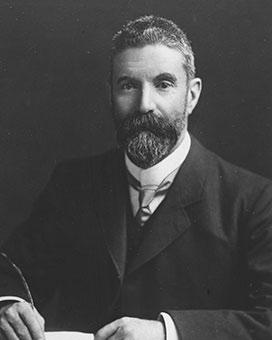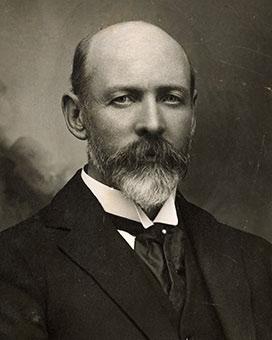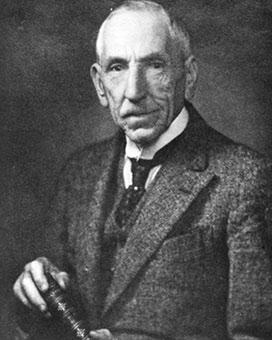A Scots miner and trades unionist who migrated to Queensland in 1885, Andrew Fisher was a founding member of the Labor Party in Queensland. He held the seat of Gympie in the Queensland parliament from 1893 to 1896 and from 1899 to 1901.
Fisher won the seat of Wide Bay at the first federal election in 1901, and held it until he retired from politics in 1915. He was Minister for Trade and Customs in Chris Watson’s Labor government in 1904 and led the Labor Party in parliament after Watson's retirement in 1907.
Fisher became Prime Minister for the first time a year later when 'new protection' dissolved, collapsing the fragile coalition with Labor that had kept Alfred Deakin in office.
At the coalface
Fisher was born on 29 August 1862 in the coalmining village of Crosshouse, near Glasgow, Scotland. He was one of 8 children of Jane and Robert Fisher. Although the legal working age was 12, Fisher was apparently aged only 10 when he joined his older brother in the mines. At 17, Fisher was local secretary of the miners' union, headed by Scots socialist James Keir Hardie. For the next 5 years, Fisher was well-known for his union work and his leadership in organising strike action. He was twice 'blacklisted' by mine owners.
In June 1885, Fisher and his brother James emigrated to Queensland. They first found work as miners on the Burrum coalfields at Torbanlea. From March 1888, they worked on the goldfields at Gympie.
In Gympie, Fisher became active in the local Presbyterian church. Equally active in the union, he was again blacklisted and became a train driver. In 1891, a year of major strike action in Queensland, Fisher was a key local figure. He was then president of the Gympie branches of the miners' union and the Workers' Political Organisation – the latter was the forerunner of the Labor Party in Queensland.
Queensland Labor
In 1892, Fisher represented Gympie at the first Queensland Labor Party convention. In May, the following year, aged 30, Fisher was elected to the seat of Gympie in the Queensland parliament. He was one of 16 Labor members in the 72-seat lower House.
Under an onslaught from the anti-socialist Gympie Times, Fisher lost the seat 4 years later. With journalist Henry Boote, he started a rival newspaper, the Gympie Truth, as a voice for labour.
In June 1898, Fisher was again a delegate to the Queensland Labor convention. The party adopted a platform that included abolition of the upper House, establishment of a government bank and government industrial enterprises, free school education, the exclusion of non-white labour from the colony and party solidarity.
The following year, campaigning on this platform, Fisher regained his Gympie seat and Labor won 25 of the 72 lower House seats. For 1 week, from 1 to 7 December 1899, Anderson Dawson led Queensland’s first Labor government. Fisher became Minister for Railways and Public Works.
1901
A firm federationist, Fisher supported the union of the Australian colonies and campaigned for the ‘Yes’ vote in Queensland’s 1899 referendum. With Federation a fact, he stood for the Wide Bay electorate at the first federal elections in March 1901. On 9 May, he was among the 111 brand-new parliamentarians sworn in at the opening of the first Commonwealth parliament in Melbourne’s Exhibition Building.
The day before, in their rather cramped meeting room in the Spring Street Parliament House, the nineteen Labor senators and their fifteen House of Representatives colleagues founded the first federal parliamentary Labor Caucus. They elected Chris Watson their leader and adopted as their platform a 'white' Australia, votes for women on the same basis as men, old age pensions, a citizen army, and the principle of compulsory arbitration in disputes between employers and employees.
On the last day of 1901, Andrew Fisher and Margaret Jane Irvine celebrated their wedding at his lodgings, the Irvine home in Cross Road, Gympie. The couple then moved into the Irvine family’s small first house in Maori Lane, Gympie, the couple's home for the next 5 years.
The new parliament
In 1902, Fisher represented the Australian Labor Party in the Australian contingent led by Edmund Barton to attend the coronation of King Edward VII and Queen Alexandra.
In September 1903, Fisher moved Labor’s attempted amendment to the Conciliation and Arbitration Bill, the most contentious bill of the first 2 parliaments. The December 1903 federal election – the first where women in all states could vote on the same basis as men – increased Labor's numbers at the expense of Alfred Deakin's Protectionists.
Deakin's government needed the support of the Labor Caucus to hold a majority against George Reid's Free Trade Opposition. When parliament resumed, Fisher again moved an amendment to the Conciliation and Arbitration Bill. Unable to command a majority of votes to defeat the motion, Deakin resigned and advised the Governor-General to ask Labor leader Chris Watson, not Reid, to form a government.
Fisher was Minister for Trade and Customs in the brief Watson government from 27 April 1904. Watson also failed to gain a majority of votes on the Conciliation and Arbitration Bill. On 18 August 1904, Watson's government fell, as had Deakin's 4 months earlier.
This was George Reid's opportunity for office – he gained enough Protectionist support to form a ministry and govern from August 1904 to 5 July 1905. For this term, Watson became Leader of the Opposition. It was the first time Labor formed the Opposition in the federal parliament.
Alfred Deakin formed his second government when Reid’s government fell in July 1905. The next month, after Watson sought to resign the leadership, the Labor Caucus elected Fisher as assistant leader of the Federal Parliamentary Party. When Watson resigned in October 1907, Fisher was elected leader. On 19 November, he delivered his first parliamentary speech as leader, supporting the nationalisation of the iron and steel industry.
'New protection' dissolved
In June 1908, the Customs Tariff and Excise Tariff bills linking industrial relations to industry protection, were finally enacted. That same month though, the High Court ruled against this 'new protection' principle in King v Barger. The majority – the original 3 judges, Samuel Griffith, Edmund Barton and Richard O'Connor – held that the excise was an unconstitutional regulation of conditions of employment. The dissenting judges, HB Higgins and Isaac Isaacs, supported parliament's right to protect labour as well as manufacturers. Isaacs pointed out that:
The power to tax is the one great power upon which the whole national fabric is based ... It is not only the power to destroy, but it is also the power to keep alive.
At the next sitting of parliament in September 1908, Fisher asserted that the conservative majority on the High Court had continued to 'conserve the rights and interests of those in possession'.
Fisher presided over the federal Labor conference in July 1908, where a resolution was passed that neither electoral nor parliamentary alliances with other parties would continue. Protection, especially in Deakin's liberal vision, had been the essential bond. In Labor's view, that bond had dissolved when the use of the tariff to protect workers, as well as employers, was ruled invalid. On other issues where Labor shared common ground with Deakin, gains had already been made, such as the Invalid and Old Age Pensions Act 1908 and its enabling Surplus Revenue Act 1908.
Women and politics
Among the issues on the agenda at the 1908 Labor conference was the political status of women. The 2 representatives of Labor women's organisations were former Queensland Australian Workers Union organiser Emma Miller and Sydney activist Kate Dwyer. In response to their arguments, Fisher stated:
I trust that not another Federal election will take place without there being a woman endorsed as a Labour candidate for the Senate and I hope that it will not be only in one State.
Although women had exercised the federal vote on the same basis as men at 2 federal elections – both of which saw substantial increases in Labor support – none of the women candidates in 1903 and 1906 had been successful. Nevertheless, Australia was still seen as a world leader in this exercise of equality, with leading figures like Vida Goldstein speaking on platforms in the United States and Britain.
With Labor strengthening its parliamentary position against the Deakin government, Keir Hardie, leader of the British Labour Party, wrote to Fisher urging him to have parliament pass a resolution urging the enfranchisement of British women.
On 10 November 1908 (4 days before Hardie's letter was written), the Labor Party withdrew support from the Deakin government. On 13 November, Fisher became Australia's 5th Prime Minister.
Sources
- Lloyd, Clem, 'Andrew Fisher' in Michelle Grattan (ed.), Australian Prime Ministers, New Holland, Melbourne, 2000, pp. 72–86.
- Malkin, John, Andrew Fisher 1862–1928, Walker & Connell, Strathclyde, c1979.
- Marginson, Geoffrey, 'Andrew Fisher – the views of the practical reformer' in DJ Murphy et al (eds), Prelude to Power: The Rise of the Labor Party in Queensland 1885–1915, Jacaranda Press, Brisbane, 1970.
- Murphy, DJ, RB Joyce and CA Hughes (eds), Prelude to Power: The Rise of the Labour Party in Queensland 1885–1915, Jacaranda Press, Brisbane, c1970.
- Souter, Gavin, Acts of Parliament, Melbourne University Press, Melbourne, 1988.
- Kier Hardie to Andrew Fisher, 4 November 1908, National Library of Australia, MS 2919/1/141





